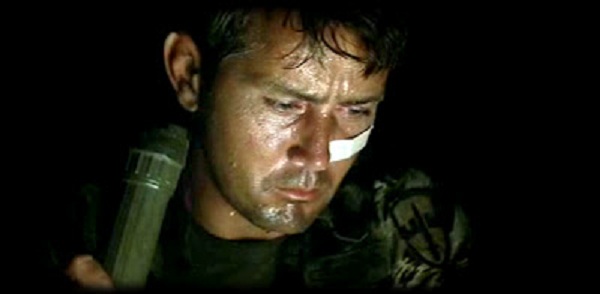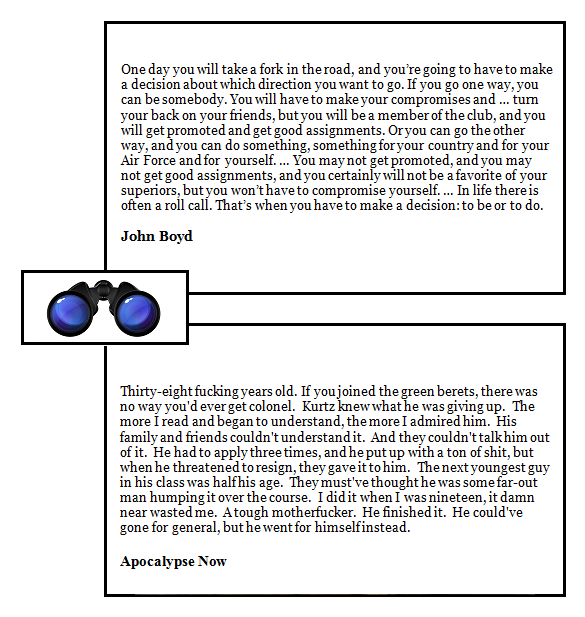To be or to do
[ by Charles Cameron — to be or to do: this one’s for Scott ]
.

Martin Sheen as Capt. Willard in Francis Ford Coppola’s Apocalypse Now
**
Of course, Col. Kurtz‘ end in the movie is more than a little different from Col. Boyd‘s — but one wonders whether John Milius was aware of the Boyd quote when he wrote that particular scene.




July 22nd, 2012 at 4:08 pm
Colonel Boyd was speaking of an individual rising or self-actualizing to the benefit of something larger than himself. The fictional Kurtz, drawn from Joseph Conrad’s Kurtz and a couple of real life scary operators in the Vietnam War (one who barely escaped court-martial for war crimes), turned that self-actualization inward to become more than man, less than human in pursuit of war for war’s sake. An agent or avatar of chaos. 180 degrees opposite of Boyd’s constructive idealization, really.
July 22nd, 2012 at 4:11 pm
And real life has generated figures worst than Kurtz:
 .
.
.
.
https://zenpundit.com/?p=3170
July 22nd, 2012 at 4:53 pm
Hi Zen:
.
I was a bit concerned when posting that juxtaposition of Boyd and Kurtz — as I often am — by the thought that some might take the juxtaposition as implying the two men were somehow the same, when they’re clearly not. As I said earlier this month, “juxtaposition does not imply eqivalence” — in fact you hit one of my own nails on the head when you call Kurtz “180 degrees opposite of Boyd’s constructive idealization, really”. Part of what’s fascinating about analysis by analogy is that it applies to opposites as well as parallels.
.
In my Intro to the Said Symphony, I laid out my own “rules of engagement” thus:
I guess what I’m getting at is that similarities of form do indeed raise questions of similarities of value — they’re provocative in that way, but not dispositive.
*
I really need to think some more about this, it ties in with the problem we have when we get an analogy in our heads and behave as though it’s an identity — as though history repeats itself without variation… as though differences were not as significant as similarities.
July 22nd, 2012 at 5:38 pm
Cath Styles’ point is significant here too, I think:
I think that’s a key insight, both about the Sembl / Hipbone games and about my own mode of thinking.
July 22nd, 2012 at 8:17 pm
Hi Charles,
.
Many thanks! I’d never thought of the connection, but perhaps there is some linkage. Boyd was a fiercely independent thinker and doer. That said, he understood the system well enough to use it when it was to his advantage…Kurtz turned his back on the system.
July 22nd, 2012 at 8:45 pm
Hi Scott:
.
You’re most welcome. I was watching the film last night, and Willard at that point in the film is reading about Kurtz’ backgound, impressive history and credentials — and his appreciation for Kurtz is growing, even as he struggles with the way a good man eventually turned rotten, and with the eventual realities of his own mission to terminate him.
.
But of course, it’s also a work of fiction, and Kurtz a study in human atavistic tendences. Even Kurtz somewhere knows he has to go.
July 8th, 2013 at 5:32 am
“Time is too slow for those who wait, Too swift for those who fear, Too long for those who grieve, Too short for those who rejoice, But for those who love, Time is eternal.” – words by Anonymous